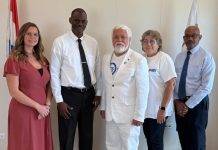by Cdr. Bud Slabbaert
No, it isn’t what you think. It’s not about climate change, pandemic, or recession. Continue reading because the clues are all around us. It is about being ‘more the show than the go’, ‘putting the money where the mouth is’ and particularly that ‘a little bit of knowledge is a dangerous thing’.
The Dunning-Kruger Effect is a phenomenon of overestimating one’s own abilities. It is far more common than you may think. Confidence is so highly prized that many people would rather pretend to be smart or skilled than risk looking inadequate and losing face. A reason to aggrandize knowledge and capabilities ties to the fact that it can feel shameful to admit that one doesn’t know something. On the social media one will inevitably come across someone who genuinely believes to have the expertise to speak with authority on a topic which they actually seem to know little or nothing about. The general tendency is to think that one is better than average. The average person thinks he isn’t.
Everything happens for a reason; sometimes the reason is a bad decision. That bad decision may be the result of the Dunning-Kruger Effect. This Effect can be observed in domains varying from business to private everyday tasks. By understanding this psychological phenomenon, one can approach situations with more humility and strive for continuous improvement rather than succumbing to false confidence based on incomplete understanding.
When starting a project or business venture, the future is translated in terms of positive outcomes, imagining that the business will start, pick up, and be successful. But the success of a business is driven less by a dream and rather more by data, research, analysis, by a customer-oriented strategy and a precise business plan. Some forecasts in the plans are like coming from an astrologer who sees the future results in the stars.
It is a form of mental bias that can have devastating effects on any business but especially start-ups where it can be an illusion that kills energy, time, money, and dreams. It happens to first-time entrepreneurs who are enthusiastic about starting a business venture but have little or no expertise or experience and demonstrate a “beginner’s bubble” of confidence.
When people are overconfident that the business will succeed without understanding how it will really happen, their overconfidence may blur the rational decision-making process, and they are tending to make decisions based entirely on their opinions. Poor decisions are likely made, and erroneous conclusions reached because of a lack of expertise and experience which denies the ability to recognize the shortcomings; simply put, not being aware of what is not known. A project may fall to illusory superiority of a decisionmaker by rating their knowledge level way higher than it actually is.
Any successful project should be an extension of data-based and unbiased decisions. It takes a strategic approach to growth. Confidence is a “must-have”. Decision-makers should be driven by their vision and knowledge to achieve their end-goal, but there is a fine line between confidence and overconfidence.
Understanding the Dunning-Kruger Effect helps recognize why some individuals exhibit unwarranted self-assurance despite lacking ample expertise in a particular subject matter yet tend to overestimate their competence. They believe that they possess above-average skills to the point that they feel confident in their abilities and act accordingly and also express themselves publicly. However, a lack of accurate knowledge about a topic combined with overly confidence may contribute to spreading misinformation.
The Effect is so obvious in many different tasks and specialized fields of knowledge related to business, politics, driving, aviation, healthcare, safety procedures, and social issues. It appears in all walks of life of the common individuals as well as in groups of people with shared interests or professions. Overly favorable views of abilities tend to be held in many social and intellectual spheres of influence.
In finance and investing, people who overestimate their knowledge and ability may confidently make unwise or overly risky investment decisions that can result in significant losses. Studies have found that less experienced drivers overestimate their driving abilities. A new driver might believe that they are excellent and take risks a more experienced driver would avoid. It can lead to accidents and other dangerous situations on the road. The Effect also exists in the world of team sports. Less skilled teammates may overestimate their abilities and make mistakes that cost their team’s chances of winning. Overconfidence can lead ‘hobby-pilots’ to operate a new aircraft for which they lack adequate training or to engage in flight maneuvers that exceed their proficiency.
The Dunning-Kruger Effect isn’t all negative. A little extra optimism and self-assuredness could be what is needed for people to achieve goals that might have seemed completely unrealistic to others. Of course, being controversial and having a fanciable imagination for a grown-up creates more attention than being boring and it can be enchanting and arousing.
However, if one thinks that one is an expert, the lesson of the Dunning-Kruger effect is that one should remain humble and cautious about oneself and recognize there is always room for improvement. It is not about dumb or intelligent people. It’s mostly about things one may not be very competent at, and one doesn’t know what one doesn’t know. It serves as a reminder that true competence requires humility and an ongoing commitment to learning and growth.






























